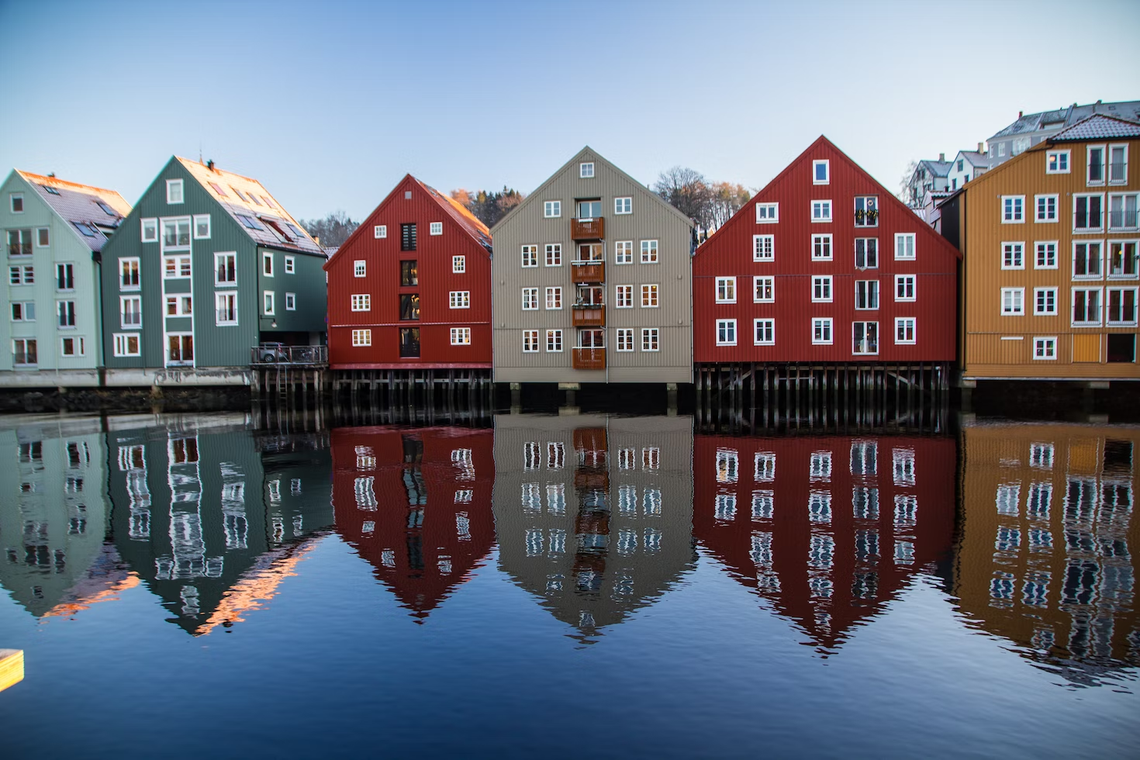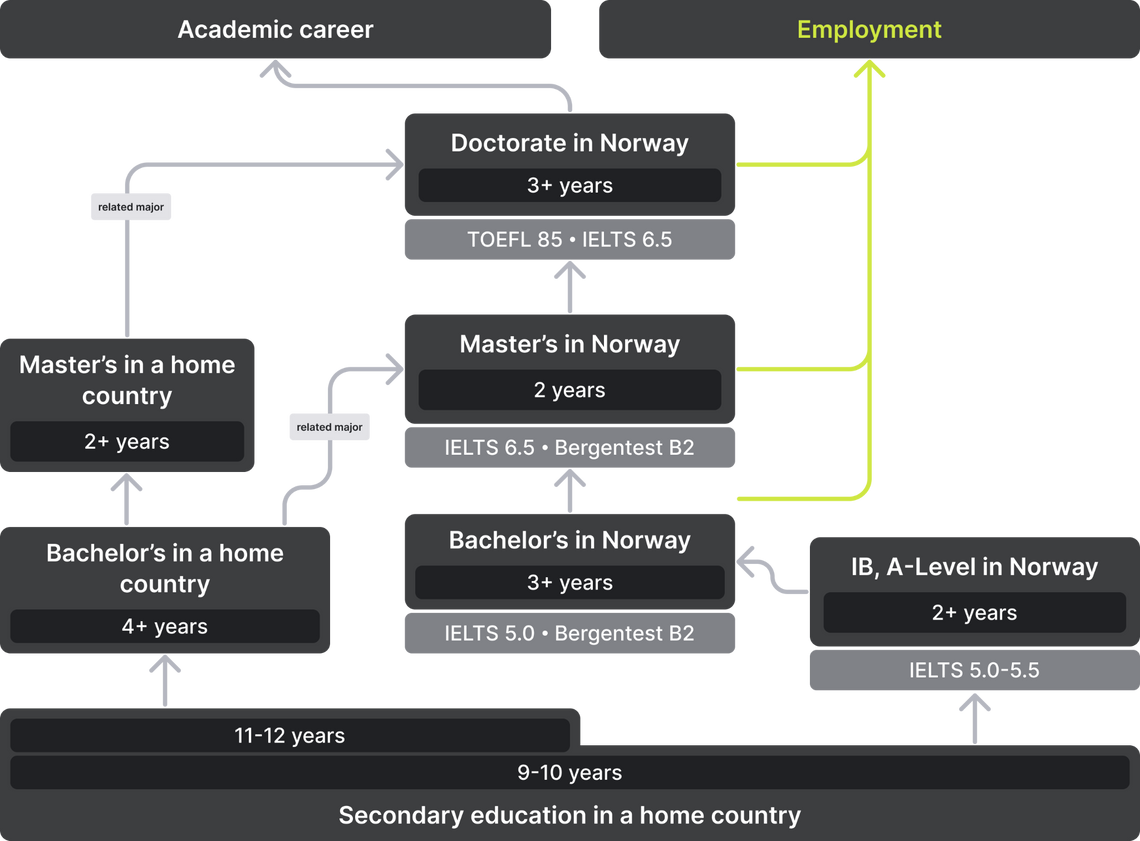
Apply to a foreign university with confidence
- Properly fulfilled documents
- Perfect motivation letter
- Support from a personal mentor
- Offers from several universities
In public universities, higher education in Norway is almost free. Read everything about Norwegian education in the article
Free consultation




Norway's secondary education system is divided into three stages: primary, lower secondary and upper secondary (high) school. Norwegians study for 13 years.
Children enter school at the age of 6 and until they reach 16 they must finish the first 10 grades of school – primary and lower secondary stages, before entering high school.
High school (11-13 grade) is not compulsory, but finding a job without graduating from high school can be challenging, so about 70 percent of Norwegians choose to undergo this stage[1]. In general, the school system in Norway is of high quality, and the country ranks third in the world in terms of expenses per student among OECD countries[2].
| Stage of study | Name in Norwegian | Age | Grades |
|---|---|---|---|
| Primary school | Barneskole | 6-13 | 1-7 |
| Lower secondary school | Ungdomsskole | 13-16 | 8-10 |
| High (upper secondary) school | Videregående skole | 16-19 | 11-13 |
More about each stage:
Almost all schools in Norway are state-owned and free for citizens. Foreigners also have the opportunity to study at a public school at any stage, but they will have to fully pay for their studies and learn one of the varieties of the Norwegian language. In English, you can study in private international schools on A-Level, or SAT preparation courses. Cost of education ranges from 3,292 USD to 20,695 USD per year, depending on the type of school and program[3][4].
Education in Norway is traditionally distinguished by high-quality standards of student preparation, accessibility and openness of universities, top of the line equipment of campuses, developed educational infrastructure, and, of course, career prospects. Nevertheless, many foreign students are scared away by the extremely high cost of living and strict visa requirements.

| Type | Age | Duration | Min. cost | Avg. cost |
|---|---|---|---|---|
| Summer camp | 5+ | 1-4 weeks | 1,411 USD/week | 2,822 USD/week |
| Language courses | 12+ | 1-12 weeks | 188 USD/week | 941 USD/week |
| Secondary education | 12+ | 1-6 years | 2,822 USD/year | 9,407 USD/year |
| Foundation | 17+ | 1 year | 7,855 USD/year | 7,855 USD/year |
| Bachelor's | 18+ | 3 years | 7,526 USD/year | 11,288 USD/year |
| Master's | 20+ | 2 years | 4,534 USD/year | 16,932 USD/year |
| MBA | 20+ | 1-2 years | 4,327 USD/year | 18,814 USD/year |
| Doctoral | 20+ | 3 years | 103 USD/year | 4,233 USD/year |
One of the bonuses of admission to Norway is the online submission of documents to universities. In the first stages, you don’t even have to send any official papers by mail, and you can come to the university 2-3 weeks before the start of training in order to go through the official student registration procedure.
An approximate list of additional costs could be as follows:
| Language exam | 158-226 USD |
| Apostille for 1 document | 34 USD |
| Translation of 1 page of a document into Norwegian / English | 16 USD |
| Registration fee for the submission of documents | 23-79 USD |
| Insurance for a year (compulsory) | 746-1,000 USD |
| Student residence permit fee | 497 USD |
| Service fee for applying for a student residence permit | 28 USD |

Not all foreign secondary qualifications are recognized in Norway. You may check the country-specific requirements using the GSU-list.
In general, if your country has an 11-year secondary education system, it is no use to submit documents to a Norwegian university, since this level of school education is considered insufficient for Norway. Unfortunately, in Norway, there are no English-language Foundation programs at state universities, nor preparatory language courses at universities (they are available only for accepted students). To date, applicants have several options for admission to bachelor’s studies in Norway:
International private schools can conduct studies in both Norwegian and English. Among them are:
The cost of training in such a school starts from 8,466 USD per year, not including the application fee (about 94 USD), the cost of accommodation, food, insurance, guardianship, transportation and other related expenses. Other requirements are easy to meet: you need to provide an extract with grades from your school for the past 2 years, write a motivation letter by hand in the language of instruction and a letter of recommendation from the teacher.
Today in Norway there is only one one-year preparatory Pathway Program for continuing education in English. It was developed jointly by the Norwegian Business School and the private Swedish University of Jonkoping. For admission, IELTS must be passed with a score of at least 5.0 and a verified copy of the school certificate with grades must be sent to the university. After the end of the program, you can begin training in the 1st year of the Norwegian Business School, but you can not enter the state university after completing this program.
Due to the difficulties described above, many students prefer to complete their undergraduate studies in their own country and apply for a master's program in Norway, to which you can apply with a bachelor’s degree from an accredited university.
Since 2003, Norway has participated in the Bologna process, therefore the country's educational system is similar to the rest of Europe and includes three stages: bachelor’s, master’s, and doctoral studies.
The academic year is divided into 2 semesters. It begins in August, so the submission of documents to state universities is held until December 1st, and in some private universities, the acceptance of documents is open until early May.
In Norwegian universities there is a six-point grading scale – from A (highest mark) to F (lowest mark), the minimum passing mark is an E. At the end of the semester, exams are held, some of them are evaluated as pass/fail. Exams can be either oral or written, the format of the meeting depends on the teacher.
| Norwegian grades | American GPA | ECTS Scale |
|---|---|---|
| A | 3.86 – 4.00 (A) | 90-100 |
| B | 3.12 – 3.86 (B +) | 80-89 |
| C | 2.37 – 3.12 (B) | 70-79 |
| D | 1.74 – 2.37 (C +) | 60-69 |
| E | 1.12 – 1.73 (C) | 50-59 |
| F | 0.00 – 1.11 (F) | 0-49 |
Norwegian schools also use a six-point system, but traditionally numbers are used instead of letters: 6 is the maximum score, and 2 – minimum passing score.

In Norway you don’t have to pass any specific internal examinations and go through the process of verifying previous education, but there are very strict language proficiency, GPA and application documents format requirements for foreign applicants.
It is important to have your language certificate on hand at the time of submitting your application. To confirm your Norwegian language proficiency you need to pass all parts of Bergentest at the level of B2 or higher or pass a language exam at the university with a grade that is no less than C+. In both cases, you will have to travel to Norway. To prove English proficiency you could pass an IELTS Academic or TOEFL ibt test.
| Education | Min.language proficiency | GPA | Additional requirements |
| Foundation | IELTS 5.0+ | D | 11+ years of school |
| Bachelor's | IELTS 5.0+ / TOEFL 60+ / Bergentest B2 | C+ | 11 years of school + 1-2 years at the university or 12-13 years of school[14] |
| Master's | IELTS 6.0+ / TOEFL 80 + / Bergenstest B2 + | C+ | Bachelor’s degree in a relevant field |
| MBA | IELTS 6.5+ / TOEFL 85 + / Bergenstest B2 + | C+ | Bachelor's degree / Experience / GMAT |
| Doctoral | IELTS 6.5+ / TOEFL 85+ | B+ | Master's degree in a relevant field |
When choosing a bachelor's degree in Norway foreign students should remember that most of the programs are taught in Norwegian and only about 15 programs are available in English.
Bachelor’s studies usually take three years to complete, but at the end of the studies, students receive a diploma equal to 180 ECTS. With so many educational hours, graduates can safely enter foreign universities where the Bologna system is in place. This educational scheme extends to the majority of natural, humanitarian, and social sciences. However, for a number of specialties, the duration of the study may be different:
In addition to fundamental knowledge, students acquire three types of skills during bachelor’s programs at Norwegian universities: analytical, theoretical, and practical. The first year of training usually has a fixed program with a large number of compulsory modules, and in the next two years, the student has the opportunity to choose the electives to refine their specialization.
In some special cases, there is no division into bachelor’s and master’s programs – this is the Norwegian analog of the Long cycle degree. Such programs generally have a strict structure – this is due to the great responsibility the universities have for their graduates:
The Bachelor’s degree can be obtained at a university, specialized university, or a University College (Høgskole).
Colleges in Norway relate to higher education, after graduation the student is awarded a bachelor's degree. The training lasts 3 years. 97% of the programs are in Norwegian. Colleges have a number of peculiarities:
Admission to colleges that are attached to universities is similar to admission to any university: you must pass the language exams (min. B2), present your GPA (min C+), and provide evidence of funds. The only difference is that the grade point average requirements are often lower than at universities.

Master’s in Norway is a popular option for international students for several reasons: a wide selection of specialties in English, and the availability of Norwegian language courses for university students.
The master's program usually lasts for 2 years. Some MBA programs take between 18 and 24 months. Norwegian universities require in-depth knowledge of the discipline that the student intends to study in the master's program. Therefore, it is necessary to complete the bachelor's program in the same or related specialty: about 80 ECTS obtained during the bachelor's program should be for the disciplines associated with the master's program. If, after graduation, the student wants to drastically change specialization, it is better to consider studying in English-speaking countries or in the Netherlands as Norway has no Pre-Masters retraining programs. On the other hand, a number of business and entrepreneurship programs are oriented towards bachelors with a non-economic education.
Almost all universities require advanced knowledge of English (IELTS 6.5+, TOEFL 85), much less often – level B2 in Norwegian or English. Most of the programs are in English.
Doctoral studies usually last for 3, in some cases 4 years. Doctoral students study for free and can receive a salary of about 45,059 USD before taxes, if they were also able to get a job at the department (application is submitted separately). The amount may vary depending on your experience, age, and university.
All PhD programs at Norwegian universities are conducted in English, as many foreign researchers participate in them. There are a few exceptions for those wishing to study Norwegian linguistics and literature, but English will still be needed at the level C1. In addition, you must complete master’s studies (120 ECTS in the subjects related to the topic of doctoral studies), as well as have an impressive resume with publications and participation at conferences. In some universities, you can be accepted with a five-year specialist diploma.
In Norway, you can get a PhD without entering a doctoral program. For instance, for achievements in a certain field (writing a valuable monograph or collection of articles).
It is extremely difficult to obtain a full-time professorship at a university because in Norway there is a multi-stage academic hierarchy and high competition:
The average age of a PhD candidate is 38 years old, and a senior lecturer/associate professor is 42 years old. Usually these 4 years the candidate holds temporary positions at the university or teaches at a university college. Only after that, if there are free places in universities, can he take the position of professor.
In addition to the main work, the teacher should spend about half of his time researching.
Salaries increase according to the status of a teacher, but even at the lowest level (holder of a PhD degree), the average salary is about 3,390 USD[15]. In addition, all teachers have the status of civil servants and a number of special social benefits.
Norway has exactly the same requirements for foreign candidates, so the teaching environment in Norway cannot be considered closed. Also, female teachers are unlikely to experience gender-based discrimination at work, as they make up almost half of the total staff.
You can learn more about academic career in Norway here.

| Scholarships | Type of studies | Funding | Deadline | Who will benefit from it |
|---|---|---|---|---|
| Mobility Grant for Norwegian Language and Literature | 1-3 months for research | 1,037 USD/month + transportation costs | April 15 | Bachelor’s and master’s university students of Scandinavian Studies or the Norwegian Language programs |
| Erasmus+ | 3-12 months for studies | Full cost | Depends on the country | Students of partner countries |
Depending on your country you will have different scholarship programs available to you. The full list can be found on the official Diku website. If your country is not on the list on the website or the conditions do not suit you, then you can try to find university grants that partially cover the cost of living in Norway. Programs can be tracked on the website, as well as on the official websites of Norwegian universities.
Nevertheless, it is worth remembering that grants are issued only to exceptional students who not simply meet the minimum requirements, but stand out and outperform other applicants.
Norwegian visa requirements vary greatly by country the student comes from. Citizens of Iceland, Denmark, Sweden of Finland do not need visas or residence for studies shorter than 6 months. For periods of studies exceeding 6 months they are required to report to a tax office in Norway for an ID check and inform them on their move to Norway.
Nationals of EEA/EFTA countries are allowed to stay and study in Norway for up to 90 days without a residence permit. Otherwise, they need to register with the Norwegian Directorate of Immigration online and then with the nearest police station in person. The documents required are:
Citizens of the rest of the countries will need to apply either for a student visa (for short-term studies) or for a student residence permit / study permit (for long-term studies — longer than 3 months). The registration process for the latter takes up to 2 months, therefore, after receiving confirmation of enrollment from the university, it is necessary to begin collecting the documents for the study permit processing as soon as possible.
In order to successfully pass the review process of your application be sure to remember the following:
Make sure to check the exact fee and list of documents specifically for your country and the type of educational institution on the official website of the Norwegian Department of Migration.

All international students regardless of citizenship have the right to work up to 20 hours a week during the term and 35-40 hours during breaks and holidays. These hours are shortened if paid university internships are included in the study process[16].
The salary of an 18-year-old novice worker at McDonald's in Oslo is 16 USD per hour[17]. If you properly plan your studies and work, you can earn more than 1,000 USD per month before taxes, which will cover part of the cost of living. However, it is worth considering that a foreign student must pass all exams on time in order to be able to extend a residence permit for the next year.
It is important to remember that when submitting documents for the extension of a residence permit, the account must have at least 11,382 USD.
EU/EEA students can stay in Norway after graduation without any limitations except for the need to register.
Non-EU graduates under a student visa or residence permit have the right to legally remain in Norway for one year after receiving a diploma in order to find work. The main difficulty is that in order to obtain a residence permit for the purpose of work, you need to have at least 246246 NOK in your bank account. In addition, you will need to provide a bank statement for 6 months, a copy of the diploma or a confirmation of readiness to complete the program on time, proof of accommodations and a number of other formal documents. Thus, it is possible to apply for permission before receiving a diploma.
There are several ways to stay in Norway for a long time:
To apply for Norwegian citizenship, you must continuously live in the country for 7 years from the last 10, have a residence permit in Norway and don’t violate the laws of the country. From January 1, 2020, Norway allows dual-citizenship if the laws of the immigrant’s home country allow it. Consideration of an application for citizenship takes up to 1 year[18].
Accelerating the process of obtaining citizenship by marrying a Norwegian citizen is very difficult – in this case, the total period of necessary residence in the country is reduced to 3 years, but the duration of the marriage should be at least 7 years.

It is important to remember that Norway is not a member of the European Union, however, in the framework of cooperation between the countries of Northern Europe, diplomas of Norwegian universities are recognized in Finland, Sweden, Iceland, and Denmark (except for diplomas in medicine and a number of special sciences). Diplomas of these countries and also Poland and Lithuania are recognized in Norway without any additional requirements. For most other countries a recognition procedure is a must.
The recognition of foreign diplomas in Norway is handled by NOKUT (Norwegian Agency for Qualitative Assessment in Education). In general, the countries of Northern Europe and the Baltic have an active policy of rapprochement in the field of education and simplification of the process of mutual recognition of degrees and diplomas[19].
In Norway, graduates of local universities have good chances of finding a job. Immigrants with higher education are employed almost as actively as locals. This conclusion can be drawn from OECD study conducted in 2018:
| Social group | Labor involvement 1 (%) | Labor involvement 2 (%) |
|---|---|---|
| Native citizens | 78.3 | 75.2 |
| Immigrants | 76.7 | 69.2 |
| Male immigrants | 82.0 | 74.1 |
| Female immigrants | 71.1 | 64.3 |
Several other factors for finding employment in Norway should be highlighted:
We tried to make the most comprehensive guide to education in Norway, but it is difficult to fit all of the information in one article. For that reason we have put the links to the major sources, where you can get more detailed information and find answers to your remaining questions.
60+ countries
we work with
$1,000,000 saved
by students through scholarships
6,400 offers
our students got